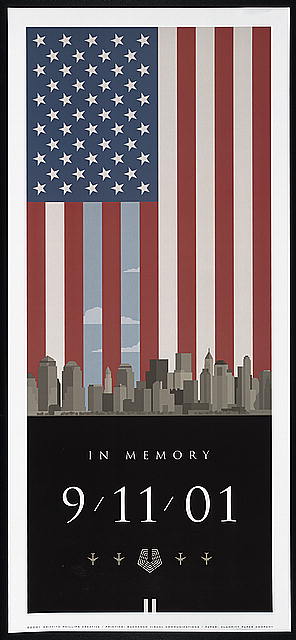Never forget the victims.
Never forget the heroes.
Never forget the sons-of-bitches that did it.
Never forget the victims.
They began jumping not long after the first plane hit the North Tower, not long after the fire started. They kept jumping until the tower fell. They jumped through windows already broken and then, later, through windows they broke themselves. They jumped to escape the smoke and the fire; they jumped when the ceilings fell and the floors collapsed; they jumped just to breathe once more before they died. They jumped continually, from all four sides of the building, and from all floors above and around the building's fatal wound. They jumped from the offices of Marsh & McLennan, the insurance company; from the offices of Cantor Fitzgerald, the bond-trading company; from Windows on the World, the restaurant on the 106th and 107th floors -- the top. For more than an hour and a half, they streamed from the building, one after another, consecutively rather than en masse, as if each individual required the sight of another individual jumping before mustering the courage to jump himself or herself. One photograph, taken at a distance, shows people jumping in perfect sequence, like parachutists, forming an arc composed of three plummeting people, evenly spaced. Indeed, there were reports that some tried parachuting, before the force generated by their fall ripped the drapes, the tablecloths, the desperately gathered fabric, from their hands. They were all, obviously, very much alive on their way down, and their way down lasted an approximate count of ten seconds. They were all, obviously, not just killed when they landed but destroyed, in body though not, one prays, in soul.
A friend of mine lives in NYC. She’s a reporter for Reuters. She was on the scene that day, watching in horror as victim after victim plummeted to their death. To this day the only time she can talk about it is halfway through a bottle of rum.
Never forget the heroes.
The story of The Man in the Red Bandana has been in the news lately. There are many, many other heroes of that day, and of the ten years after, but the saga of Welles Crowther resonates with me for one simple reason. I often carry a red bandana in my back pocket – have done so for decades. While I would never compare myself with Welles, after reading his story I say a simple little prayer for him and everyone else whenever I pull that bandana out and mop my brow, or wipe my hands, or use it to clean my glasses, or whatever.
They sat bloody and petrified -- the lights out, smoke engulfing the room and pain searing through their bodies. There was no escape from where they were in the South Tower, in pieces after being hit by United Airlines Flight 175 as far as they could tell.
Then out of nowhere, a young man burst in and took control. In a strong, authoritative voice, he directed them to the stairway -- which was veiled by darkness, wreckage and haze -- telling the injured to get out and the healthy to help them down.
"I see this incredible hero, running back and forth and saving the day," recalled Judy Wein. "In his mind, he had a duty to do -- to save people."
"He's definitely my guardian angel -- no ifs, ands or buts -- because without him, we would be sitting there, waiting [until] the building came down," echoes Ling Young.
Wein and Young were separated by a few minutes and a few floors that day, but they share a similar story and a single hero: Welles Crowther.
Both women credit the equities trader and volunteer firefighter with saving their lives and dozens of others on September 11.
But until a few months ago, Crowther was just an unforgettable face to Young. Wein remembered his penetrating eyes, firm voice and the red bandana he wore over his nose and mouth that late summer day -- but didn't know his name.
That changed late last May, when a New York Times article featuring a description of the man in the tell-tale bandanna led Welles' mother, Allison, to Wein and then to Young.
Allison said the New York medical examiner's office told them Welles' body had been found intact, with no signs of burns, alongside firefighters and emergency workers then running a command center in the South Tower's lobby.
Authorities speculated, according to Allison, that Welles was aiding the rescue effort as a civilian usher when he died, suddenly and painlessly, when the building fell.
"He was the cowboy coming in to save the town," Wein said. "In this day and age when we have no real heroes, here was a young man who basically gave his life," she said.
Never forget the sons-of-bitches that did it.
Flight 93 should be remembered for many reasons.
Foremost is that it was the first victory in the War on Terrorism, though it came at a high price. The terrorists' plan depended on the passenger's common assumption that their temporary cooperation with hijackers would likely result in their eventual release or rescue, which is how most hijackings had ended in the past.
That assumption forever changed the instant Flight 93 passengers learned the fate of the other three hijacked planes. The passengers knew that any chance of survival was not a matter of negotiation and diplomacy -- it was a matter of fighting force with force. That is exactly what America should have been doing all along with Islamic terrorists and their supporters.
Passenger Jeremy Glick spoke these words to his wife minutes before the crash: "Our best chance is to fight these people, rather than accept it." His words were true before 9/11 and they are still true today.
Never forget the victims.
Never forget the heroes.
Never forget the sons-of-bitches that did it.





1 comment:
Well said Sir, well said...
Post a Comment